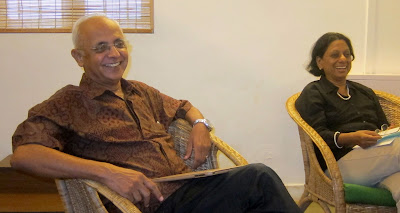Pnin - first edition
cover, 1957
Pnin
is the novel that most nearly reflects the life experiences of
Nabokov: as an émigré from Russia living in Europe, an immigrant to
America, and a professor at an upstate New York college. Pnin and Nabokov
are both possessed by an intense nostalgia for the Russia and St
Petersburg of their youth, and a revulsion for the totalitarian
regime that followed.
Vladimir Nabokov, lepidopterist
The
novel also allows Nabokov room to indulge some of his pet peeves,
such as psychiatry (Pnin‘s first wife is a psychiatrist). He lampoons
the ridiculous investigations that go by the name of research in
academia. This novel belongs to the campus genre, but its unique
feature is the character of Pnin. The reader will sympathise; Pnin is
not a fool but a victim, partly of his own eccentricities and
obsessions, and partly of the strange land in which nothing comports
with prior expectation.
Thommo & Pamela
There
is a rich vein of humour, accompanied by a quiet sadness, and
relieved by an optimism nowhere revealed as well as when Pnin meets
Victor, the son of his ex-wife. Pnin delicately welcomes him with a
football. Without any obligation he is going to take care of Victor's
pocket money at the expensive prep school.
Hemjith & KumKum
This
novel which Nabokov wrote as a sequence of stories for the New
Yorker magazine, beginning in 1953, became a successful English novel
when published by Doubleday in 1957. He was writing Lolita during
this time, and when that novel came out, Nabokov could give up his teaching
at Cornell (aka Waindell) and retire to the Montreux Palace Hotel in
Geneva to devote himself to writing, lepidoptery, and composing chess
problems, for the rest of his life.
Hemjith & Shoba
There
are many memorable quotes:
Some
people – and I am one of them – hate happy ends. We feel cheated.
Harm is the norm. Doom should not jam.
There
is an old American saying ‘He who lives in a glass house should not
try to kill two birds with one stone.’
Why
not leave their private sorrows to people? Is sorrow not, one asks,
the only thing in the world people really possess?
No
jewels, save my eyes, do I own, but I have a rose which is even
softer than my rosy lips.
The
evolution of sense is, in a sense, the evolution of nonsense.
I
do not understand what is advertisement and what is not
advertisement.
Joe, Pamela, Priya, Thommo, Hemjith (seated) Sunil, KumKum, Shoba, Zakia




















































